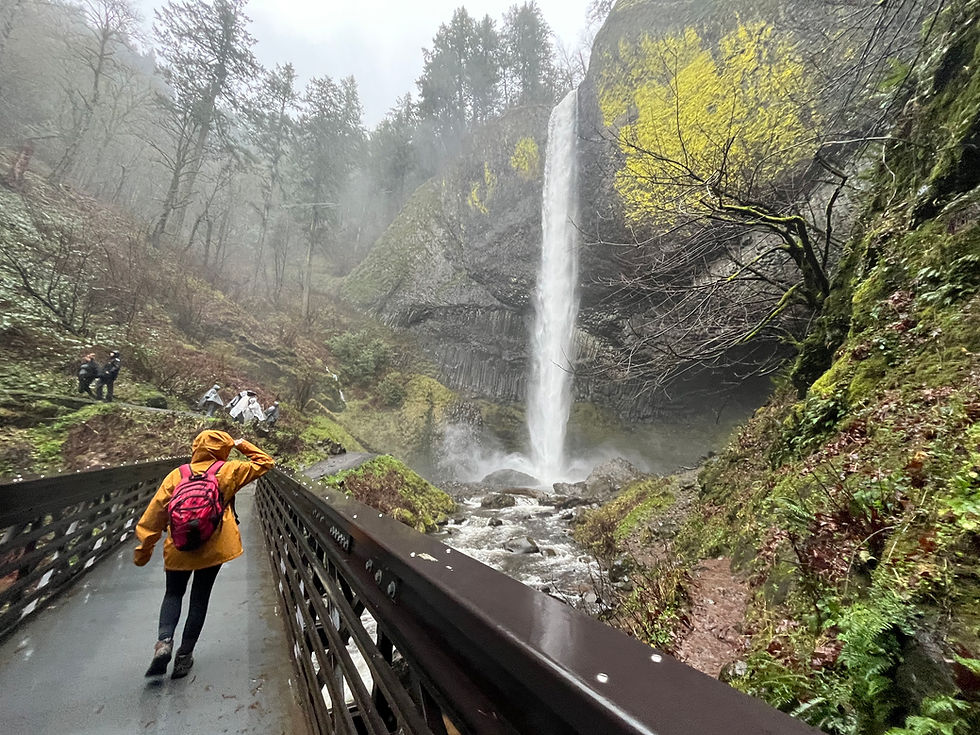Backpacking Weight: How Much Should My Pack Weigh?
- Tiff

- Feb 8, 2023
- 4 min read
Updated: Oct 23, 2023

You're about to embark on a journey into the wilderness with nothin' but a backpack and a sense of adventure! Everything that you need and want is now part of you via your pack. You are one with your pack! You literally have no other choice!
Every pound that your pack weighs is now added to your own weight which you will be carrying with you for miles and miles and miles. You may find that when you take your pack off to sit or to sleep at night, part of you is missing. That's because part of you is missing: your pack, which is now an extension of you. Congrats, you're a backpacker.
Since you and your pack are now one, you will spend every waking and walking moment together. You absorb your backpack's weight, so let's go over some of the basics of pack weight and what factors to consider when calculating your weight.
Pack Weight
You're about to spend hours trekking up and down mountains. Every ounce counts. The typical thought process of backpackers is to pack light. It's very different than if you're packing a suitcase or a car for a camping trip. Everything in your pack is considered essential, or else there's really no use to lug around the extra weight.
The typical backpacking rule is that your total pack should weigh 20% of your body weight. This can be tricky on multi-day trips when you have to pack a lot of food. 20% can also be a lot of weight if you're summiting a mountain! The lighter your pack is, theoretically the "easier" it will be to hike. You have to be strategic about what you pack to make sure that your pack isn't going to literally weigh you down.
However, I don't really subscribe to average measurements such as this. There are so many factors that play into how much your pack should weigh and what you need to carry, including:
your weight
your strength
your endurance
your fitness level
location of the trail
the season you're hiking
training time
wanted amenities
your willpower
your budget (gear is expensive)
Your pack will vary in weight when these factors change, which they will. If you want to do a winter hike you have to stay warm, which means more gear and more weight. 20% puts a rough measurement of how much your pack should weigh, but you know your body best. Do what you're capable of doing.
My heaviest pack was 49 lbs including food, which exceeds the 20% rule and most backpacking weight "rules" ever. I was packing for nine days worth of food and didn't want to sacrifice my gear for sake of weight. It was tough for the first two or so days. I was tired and had to take breaks. Yet, the great thing about total weight is that it decreases over time because you eat the food that weighs your pack down.
What's Base Weight?
Base weight is what your bag weighs before you add your food and water.
If you're curious about what your base weight is, here's a link to a pretty sweet base weight calculator.
Types of Backpackers
There are three main types of backpackers, each distinguished by their pack weight.
FYI: this is for multi-day backpacking. Day hiking is different. You probably won't need a tent while day hiking unless you're:
trailing for a multiday or;
prone to getting extremely lost, in which case a tent may come in handy
You're going to be carrying your life when out on the trail. Turns out your backpacking experience can be measured, and it's by how many pounds you hold.
Ultralight Backpacking
People who are really extreme go ultralight. The bag itself is only about 2 to 3 pounds (lbs). This is not me. I like my 4.467 lbs bag. Maybe I'll venture out into ultralight at some point in my life, who knows! If it's for you, run with it (which you are probably capable of because your pack is so light).
Ultralight backpackers hold less than 10 lbs base weight. It may seem unmanageable (to me), but it's possible. You have to make major sacrifices of "luxury" items, but the hardcore ultralight backpackers make it happen. Respect.
Lightweight Backpacking
Lightweight backpackers carry 11 to 19 lbs base weight. It helps to travel with others to start off your lightweight experience because you can distribute weight across packs. For example, if you carry a stove, your partner can carry the propane. The same goes for first aid equipment, emergency gear, etc. It saves you both a couple of ounces, which adds up!
Normal People (Just Kidding!)/ Typical Weight
A pack that is or exceeds 20 lbs base weight is pretty typical for an average backpacker. The standard is really around 30 lbs base weight. After your first trip, you'll realize if you packed too much or too little. The more experience you get, the more you'll figure out what works and what doesn't work for you.

So here ya go, the basic measurements of backpacking weight! Remember, your journey will help determine your pack weight... and your pack weight will help determine your journey. You'll also learn that some of the things you think are necessary aren't all that important (extra duct tape) and the stuff you didn't think you need is missed all too dearly (Prep-H). Happy Packing!






Comments